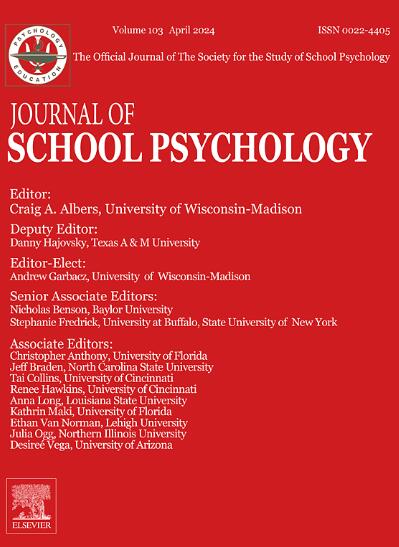研究情境、身份和文化在干预研究中的作用的因果调节分析的实用指南
IF 4.1
1区 心理学
Q1 PSYCHOLOGY, SOCIAL
引用次数: 0
摘要
背景、身份和文化因素不仅与学生的成绩有关,而且还可以调节干预措施的效果。然而,学校心理学中常用的传统适度分析受到选择偏差的影响,可能会在估计调节效应时引入偏差。本文提供了一个关于在调查干预研究中的情境、身份和文化影响的背景下应用最近开发的因果调节效应框架的教程。以教师课堂管理项目在改善学生社会和行为结果方面的有效性为例,我们展示了(稳定的)逆概率处理加权法在异质性处理效果研究中的应用。分析的目的不仅是审查整个样本的平均缓和治疗效果(AMTE),而且还审查目标亚组的平均缓和治疗效果(AMTS)。最后,我们讨论了我们的研究结果,并对因果调节分析的应用提出了建议。本文章由计算机程序翻译,如有差异,请以英文原文为准。
A practical guide to causal moderation analysis for investigating the role of context, identity, and culture in intervention research
Contextual, identity, and cultural factors are not only associated with student outcomes but can also serve to moderate the effects of interventions. However, the conventional analysis of moderation commonly used in school psychology is subject to the selection bias potentially introducing bias into estimated moderator effects. This article provides a tutorial on the application of a recently developed framework for causal moderation effects within the context of investigating contextual, identity, and cultural effects in intervention research. Using an example that focuses on the effectiveness of a teacher classroom management program in improving students' social and behavioral outcomes, we demonstrate the application of the (stabilized) Inverse Probability Treatment Weighting method to investigate heterogeneous treatment effects. The analysis aims to scrutinize not only the Average Moderated Treatment Effect (AMTE) across the whole sample but also the Average Moderated Treatment Effects on Targeted Subgroups (AMTS). Finally, we discuss our findings and conclude with suggestions for the application of causal moderation analysis.
求助全文
通过发布文献求助,成功后即可免费获取论文全文。
去求助
来源期刊

Journal of School Psychology
PSYCHOLOGY, EDUCATIONAL-
CiteScore
6.70
自引率
8.00%
发文量
71
期刊介绍:
The Journal of School Psychology publishes original empirical articles and critical reviews of the literature on research and practices relevant to psychological and behavioral processes in school settings. JSP presents research on intervention mechanisms and approaches; schooling effects on the development of social, cognitive, mental-health, and achievement-related outcomes; assessment; and consultation. Submissions from a variety of disciplines are encouraged. All manuscripts are read by the Editor and one or more editorial consultants with the intent of providing appropriate and constructive written reviews.
 求助内容:
求助内容: 应助结果提醒方式:
应助结果提醒方式:


